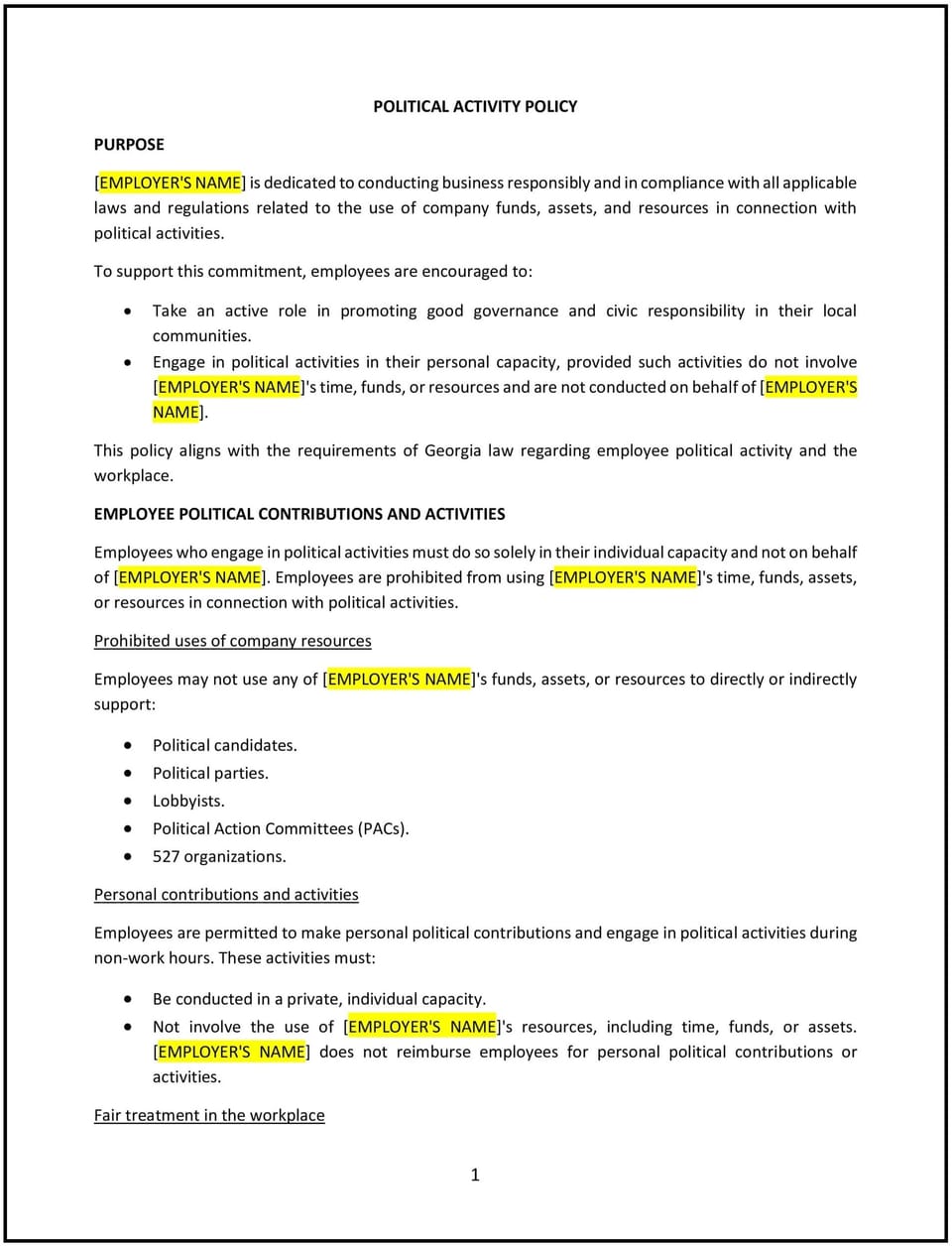Political activity policy (Georgia): Free template

Political activity policy (Georgia)
This political activity policy is designed to help Georgia businesses provide clear guidelines for employees engaging in political activities while maintaining workplace neutrality. The policy outlines acceptable practices, prohibited activities, and expectations for balancing personal expression with professional responsibilities.
By implementing this policy, businesses can promote a respectful and inclusive work environment while avoiding conflicts or disruptions.
How to use this political activity policy (Georgia)
- Define political activity: Specify what constitutes political activity, such as campaigning, soliciting donations, or attending political events.
- Set boundaries: Clarify that political activity should not interfere with work responsibilities, workplace harmony, or business operations.
- Address workplace campaigning: Prohibit campaigning, solicitation, or distribution of political materials during work hours or on company property.
- Allow personal expression: Permit employees to engage in political activities outside of work, provided they do not represent the business or conflict with its values.
- Provide time-off guidelines: Specify procedures for requesting time off to vote or participate in civic duties, such as complying with Georgia’s voting laws.
- Prohibit retaliation: Ensure employees are protected from retaliation based on their political beliefs or activities conducted outside of work.
- Establish reporting channels: Offer a process for employees to report concerns or violations related to political activity in the workplace.
- Review and update regularly: Periodically assess the policy to reflect changes in Georgia workplace practices, political dynamics, or legal requirements.
Benefits of using this political activity policy (Georgia)
Implementing this policy provides several advantages for Georgia businesses:
- Promotes inclusivity: Clear guidelines help maintain a respectful workplace where diverse political views can coexist.
- Reduces conflicts: Setting boundaries for political activity prevents workplace disruptions and misunderstandings.
- Protects neutrality: Ensures the business remains neutral and professional in its public image.
- Enhances employee morale: Employees feel supported in their right to personal political expression outside of work.
- Reflects Georgia-specific practices: Tailoring the policy to local laws and cultural dynamics ensures its relevance and effectiveness.
Tips for using this political activity policy (Georgia)
- Communicate expectations: Clearly share the policy with employees to avoid misunderstandings about acceptable political activities.
- Provide voting resources: Encourage employees to participate in elections by providing information on Georgia voting laws and resources.
- Maintain neutrality: Avoid endorsing political candidates or parties as a business to maintain workplace neutrality.
- Monitor workplace harmony: Address conflicts related to political discussions or activities promptly to maintain a positive environment.
- Encourage reporting: Foster an open-door culture where employees feel comfortable reporting policy violations or concerns.
Q: What types of political activities are prohibited in the workplace?
A: Activities such as campaigning, soliciting political donations, or distributing political materials during work hours or on company property should be avoided.
Q: Can employees wear political attire or accessories to work?
A: Businesses should define acceptable standards for workplace attire and address whether political symbols are permitted.
Q: Are employees allowed to participate in political activities outside of work?
A: Yes, employees should engage in political activities on their own time, ensuring that such activities do not conflict with their job responsibilities or misrepresent the business.
Q: How can employees request time off to vote?
A: Employees should follow the business’s standard leave request procedures, ensuring their request aligns with Georgia’s voting laws.
Q: What should businesses do if political discussions create conflicts among employees?
A: Managers should address conflicts promptly by reinforcing the policy’s guidelines and promoting respectful communication.
Q: Are businesses allowed to endorse political candidates or parties?
A: Businesses should maintain neutrality in political matters to avoid alienating employees or customers with differing views.
Q: How often should this policy be reviewed?
A: The policy should be reviewed annually or as needed to reflect changes in Georgia’s political landscape or workplace practices.
This article contains general legal information and does not contain legal advice. Cobrief is not a law firm or a substitute for an attorney or law firm. The law is complex and changes often. For legal advice, please ask a lawyer.


